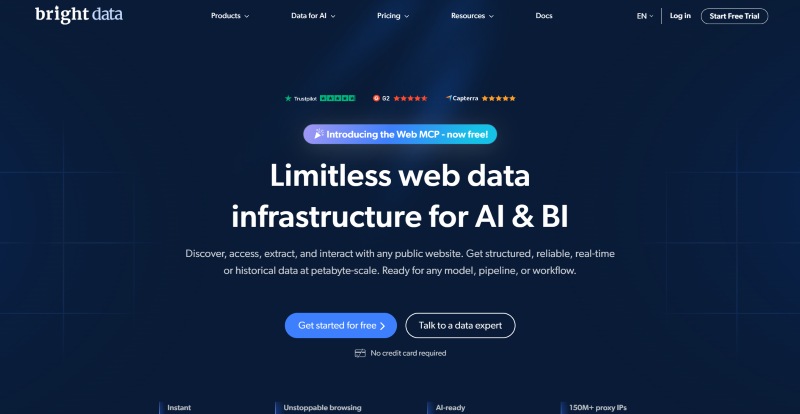TechRadar Verdict
Bright Data is an advanced and sophisticated proxy provider with a broad array of features and extras. It’s expensive, but worth it for high-volume proxy users.
Pros
- +
Extensive third-party integration
- +
150 million+ IPs available
- +
Premium customer support
- +
Top-level security
Cons
- -
A bit pricey
- -
Limited free trial options
Why you can trust TechRadar
Originally named Luminati Networks, Bright Data traces its beginnings back to 2014, when it was established as a division of a renowned VPN service called Hola. In 2017, it was sold separately from Hola and rebranded under its current name in 2021 to highlight its goal of helping users scrape data with its proxy services.
Today, Bright Data provides access to its 150 million-strong collection of proxy IPs, including to more than 20,000 enterprises. Alongside individual users, they rely on its residential, datacenter, and mobile proxies to circumvent geographical restrictions and scrape important information.
- Want to try Bright Data? Check out the website here
Plans and Pricing
Due to offering different types of proxies and related services, Bright Data has several pricing options.
Users pay for residential proxies according to the bandwidth they consume. Bright Data offers three standard plans, currently at a 50% discount for the first three months: $499 monthly for 141 GB, $999 monthly for 332 GB, and $1,999 monthly for 798 GB. Alternatively, you can choose the pay-as-you-go option starting at $4 per GB. The drawback is that the pay-as-you-go plan is slightly more expensive in the long run ($4 per GB compared to $3.5 per GB on the standard 141 GB plan). If you need more than 1 TB, you can reach out to the company for customized pricing.
For datacenter proxies, users can pay according to the number of IP addresses they require. The standard plans are 10 IPS at $14 per month ($1.4 per IP), 100 IPs at $100 per month ($1 per IP), 500 IPs for $475 per month ($0.95 per IP), and 1,000 IPs at $900 per month ($0.9 per IP). As with residential proxies, if these plans don’t meet your needs, you can contact the company for tailored pricing above 1,000 IPs. Users can also pay for datacenter proxies according to bandwidth. The standard plans are $499 monthly for 1 TB, $999 monthly for 2 TB, and $1,999 monthly for 5 TB. The pay-as-you-go option with no monthly commitment costs $0.6 per GB.
Dedicated datacenter proxies are pricier.
If you need ISP proxies, Bright Data has four standard plans to offer you: $18/month for 10 IPs ($1.8 per IP), $145/month for 100 IPs ($1.45 per IP), $700/month for 500 IPs ($1.4 per IP), and $1,300/month for 1,000 IPs ($1.3 per IP). You can also pay for ISP proxies according to bandwidth. The standard plans are $499 monthly for 39 GB, $999 monthly for 88 GB, and $1,999 monthly for 190 GB. The pay-as-you-go option with no monthly commitment costs $15 per GB.
Dedicated ISP IPs are a bit more expensive but follow the same structure. Similarly to residential and datacenter plans, should you require over 1,000 IPs or 1 TB, you’ll need to check in with the Bright Data team directly.
Sign up to the TechRadar Pro newsletter to get all the top news, opinion, features and guidance your business needs to succeed!
Mobile proxies are priced similarly to residential proxies, $499/month for 71 GB, $999/month for 166 GB, and $1,999/month for 399 GB, with the possibility to get the pay-as-you-go, no commitment option at $8 per GB.
Bright Data offers sophisticated web access APIs with its Web Unlocker API pricing coming in three standard versions: Growth for $499 monthly ($1.3 per 1,000 results), Business for $999 monthly ($1.1 per 1,000 results), and Premium for $1,999 monthly ($1 per 1,000 results). The higher your plan, the greater the scraping requests available each month. If you don’t want a monthly commitment, you can choose the $1.5 per 1,000 results pay-as-you-go plan.
It also has a similarly priced Web Scraper API, at $499/month for 1K records under the Growth subscription, $999/month for 1K records included in the Business plan, and $1,999/month for 1K records as offered by the Premium pricing tier. These are currently available at a 25% discount. As expected, there’s a pay-as-you-go option at $1.5 per 1K records.
SERP API has the same pricing structure as the Web Scraper API, except that it’s currently available at a 50% discount for the first six months of use. The Browser API pricing follows much the same sentiment, costing $499/month for 71 GB, $999/month for 166 GB, and $1,999/month for 399 GB. The no-commitment option is charged $8 per GB.
Alternatively, you can run your scrapers as serverless functions at $500/month + compute time of $0.095/hr under the Growth plan, $1,000/month + $0.09/hr compute time as part of the Business option, and $2,000 + $0.085/hr compute time included in the Enterprise subscription.
Finally, Bright Data offers pre-built datasets, a unique feature that many proxy platforms don’t have. Starting at $250 per month for 100,000 records, these datasets allow businesses to access ready-made data instead of scraping it from scratch at higher costs. Available datasets include Amazon products, Yahoo Finance stock market data, Zillow real estate listings, LinkedIn profiles, and much, much more.
There’s no free trial available per se, but you do get $2 in credits when first signing up. Bright Data also offers a 7-day free trial for registered companies. This trial period is short, but it helps users test the features before committing to a monthly or pay-as-you-go plan.
Features
Accessing Bright Data’s features starts with registration. To sign up as a new user, you’ll need a work email address, but the platform also supports logging in with Google and GitHub accounts. You'll receive a verification email after signing up and creating a password.
Residential Proxies
Bright Data offers proxy IP addresses sourced from physical devices worldwide. People agree to add their devices to the network for a benefit, such as a VPN subscription. Bright Data’s users can then choose one of the IPs to bypass geo-restrictions and scrape data.
This platform offers over 150 million ethically sourced residential proxies from 195 countries, with the most popular locations being Brazil, India, the U.S., the U.K., Germany, Russia, and China. Residential proxies rotate IP addresses, i.e., change with each browsing session.
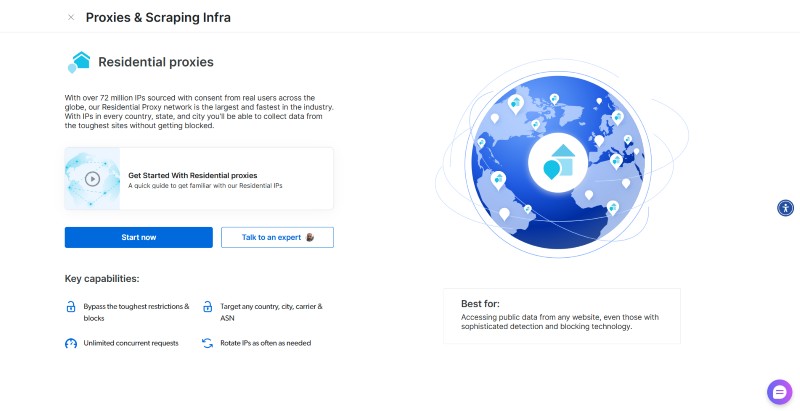
During our test, the residential proxies had excellent speed and reliability. Both static and rotating proxies allowed us to surf the web seamlessly and bypass strict website geo-restrictions. You can manage all proxies from your user dashboard, deploying new ones or removing existing ones at will.
Bright Data gives you significant control over your proxies. You can choose proxies from specific cities, states, and countries. The robust IP network, especially in Europe and North America, makes it easier to bypass geo-restrictions. If an IP address can’t successfully bypass the restriction, Bright Data rotates different IP addresses until it succeeds.
ISP Proxies
ISP proxies are static residential proxies sourced directly from Internet Service Providers (ISPs). Unlike residential IPs that rotate with each browsing session, a static ISP proxy is assigned only to you. You can keep this static IP for as long as your subscription lasts.
Bright Data offers a network of 1,300,000+ fully compliant static IPs, with the most popular locations being the U.S., U.K., Germany, Italy, and France. The U.S. has the highest number of static IPs - 1,173,705 - while all other countries have fewer than 15,000 each. This smaller number is expected because of the higher costs and difficulty of obtaining IP addresses directly from ISPs.
The static ISP proxies offered excellent speed and reliability during our test. Bright Data lets users manage static IPs directly from their Control Panel or an external API. The user-friendly Control Panel makes it easy to deploy and organize a large number of proxies.
ISP proxies are more reliable than typical residential proxies because they don’t change frequently. Using one IP address for a long period makes it easier to browse anonymously and break through geographical and IP website restrictions. Once you bypass a site’s restriction with a static IP, you can continue accessing the site with that IP. In contrast, rotating proxies mean you can bypass a site’s restriction today and struggle to bypass it tomorrow with a new IP address. Expectedly, Bright Data’s static IPs cost more than rotating IPs.
Datacenter Proxies
Datacenter proxies are sourced from secondary corporations rather than ISPs. A server (in a datacenter) with a unique IP acts as the intermediary between your device and a website you want to access. You can request a shared or dedicated datacenter IP: a dedicated IP is more reliable in circumventing site blockades.
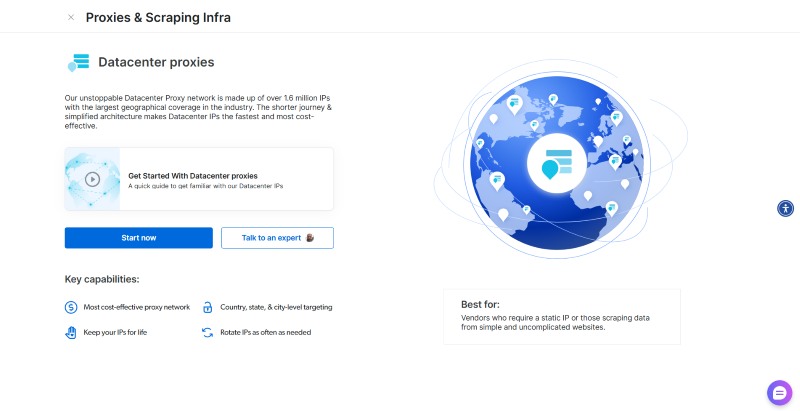
Bright Data offers 770,000+ datacenter proxies in 98 countries, unlike residential proxies available in 195 countries. You can select your datacenter proxy by specific city or country. These proxies are fast because your browser request is sent directly from the proxy server to the target website, unlike residential proxies that can bounce through several devices before reaching the target site.
The drawback is that datacenter proxies are more vulnerable to detection because of their less diverse IP range. They are cost-effective but less efficient at bypassing geo-restrictions than residential and ISP proxies.
Mobile proxies
Bright Data’s pool includes over 7 million mobile proxy IPs from 195 countries. These residential IPs are sourced from mobile devices across the globe, with India, the U.S., and Brazil having the largest share in Bright Data’s pool. You can use these IPs to surf the web from the eyes of real mobile users. You can choose IPs from 3G, 4G, or 5G networks.
During our test, Bright Data’s mobile proxies provided top-notch browsing speed. We tested IPs from different countries, and they worked reliably. Usually, mobile IPs are more expensive than residential IPs from PCs, but Bright Data charges the same amount for both.
Web Scraper API
Web scraping is one of the most common use cases for proxy servers. Some businesses need to scrape massive amounts of data from a website, e.g., pricing data from retail sites. However, many websites discourage scraping by implementing geographical and IP restrictions. Proxy IPs let businesses bypass these restrictions and scrape their desired data.
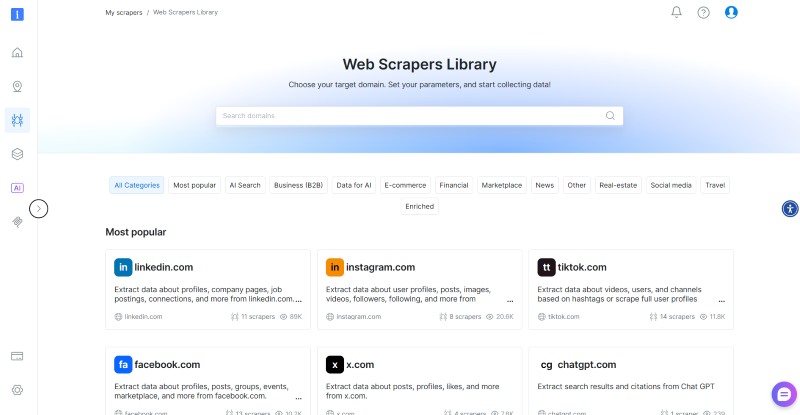
As a first-rate platform, Bright Data doesn’t stop at providing proxy IP addresses for web scraping. It also provides APIs that let businesses automate data scraping. It has ready-made scraping APIs for websites like Facebook, Amazon, LinkedIn, Zillow, X, ChatGPT, and TikTok. Several websites, such as Facebook, have filed lawsuits to block these scraping APIs, but Bright Data has countersued and prevailed.
Suppose you run a price comparison site that helps people find the best e-commerce deals. You can use Bright Data’s APIs to automate data scraping from Amazon, Walmart, eBay, and other popular e-commerce sites. You’ll then clean the scraped data and display it on your price comparison website.
Bright Data's APIs can handle bulk scraping requests, convert raw HTML into structured data, and validate data automatically. Pricing depends on the number of API requests you make.
Dataset Marketplace
You don’t always have to scrape data from scratch. Bright Data offers an alternative: ready-made datasets sourced from different websites. It provides pre-built datasets from many websites, like LinkedIn, Pinterest, Crunchbase, Amazon, and Redfin. You can also get categorical datasets, such as car prices, housing prices, crime rates, NBA players' stats, etc.
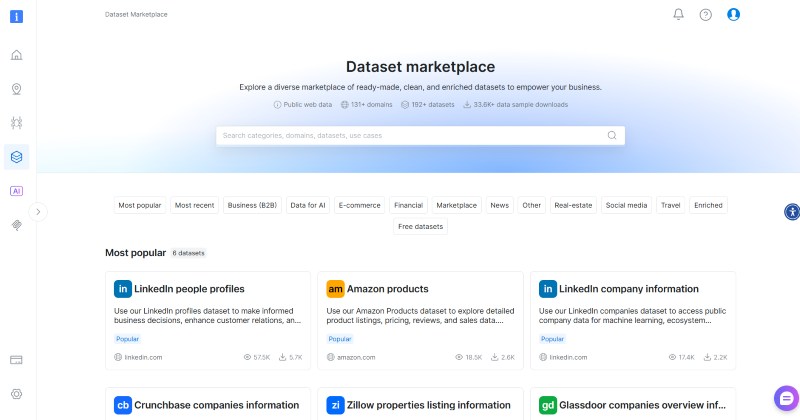
Pre-built datasets reduce headaches for businesses. Instead of scraping data from scratch and waiting a while to access it, you can access datasets already scraped by others. Pricing starts from $250 monthly for 100,000 records.
Ease of Use
Bright Data has an intuitive interface you’ll likely enjoy using. The left menu has all the features you need to access, and the right side is the main dashboard. Many features are neatly arranged across the dashboard to make them easy to find. With a white background and a few contrasting colors, Bright Data’s interface looks visually pleasing.
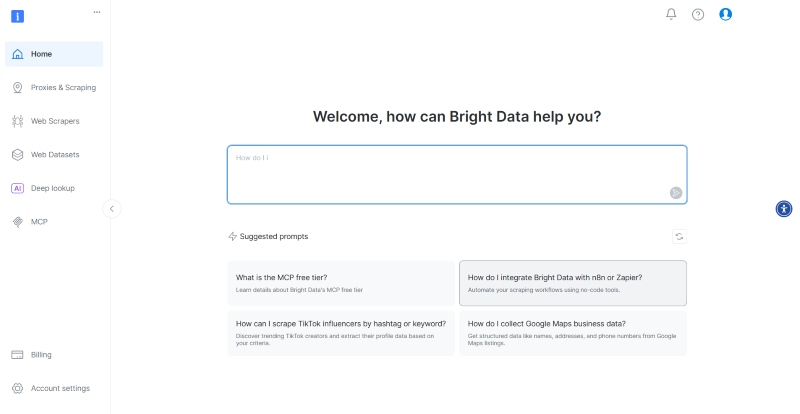
You can access this proxy software primarily from the desktop interface. There’s also a Google Chrome extension that lets you seamlessly change proxy locations. Bright Data's user-friendliness is unmatched by most rivals.
Customer Support
One of Bright Data’s strengths is its top-notch support. You can contact its support team 24/7 and receive a response in less than 30 minutes. It offers support via live chat and email, but there’s no telephone support.
Bright Data also provides extensive documentation and user manuals to help users figure out solutions to their problems. The website’s Docs section contains detailed guides for all features and an API reference that helps users write effective data scraping commands.
We found Bright Data’s documentation easy to follow and helpful for our test. For instance, we followed the web scraping tutorial to harvest data from an external website.
The Competition
The proxy software market is very competitive. There’s no shortage of rivals to Bright Data, and the ones we’d like to highlight are Decodo (formerly Smartproxy), Oxylabs, and Webshare.
Decodo is an excellent proxy provider offering residential, ISP, and datacenter proxies. It's a cost-effective alternative with a large pool of 125 million+ IPs across 195 countries. However, Bright Data has a larger IP pool across the same number of countries and offers more features and customizability.
Oxylabs offers a slightly larger IP pool, with 175 million+ addresses compared to Bright Data’s 150 million+. Both platforms have similar offerings, but Bright Data provides some features not available in the other, such as a dataset marketplace and a web IDE. Bright Data also has a more responsive support team than Oxylabs, according to our experience when testing both.
Webshare is one of the best alternatives that go head-to-head with Bright Data. It’s a more affordable tool, which is crucial for small businesses. It offers effective APIs to scrape data en masse, just like Bright Data. However, Webshare has a much smaller pool of IP addresses: roughly 80 million compared to Bright Data’s 150 million.
Final Verdict
Bright Data is a comprehensive provider of proxy and proxy-related services. It offers not just tons of IP addresses covering the entire world, but also throws in quite a few extras for good measure. These include different kinds of web scraping APIs and even pre-built datasets. Thanks to these features, it’s well equipped to provide you with anything you need to bypass website restrictions and scrape any required data. There are a few drawbacks here and there, primarily its higher cost compared to the competition, but it might well be worth it, especially for high-volume needs.
We've also highlighted the best proxy and best VPN
Stefan has always been a lover of tech. He graduated with an MSc in geological engineering but soon discovered he had a knack for writing instead. So he decided to combine his newfound and life-long passions to become a technology writer. As a freelance content writer, Stefan can break down complex technological topics, making them easily digestible for the lay audience.
- Sead Fadilpašić
- Mike WilliamsLead security reviewer
You must confirm your public display name before commenting
Please logout and then login again, you will then be prompted to enter your display name.
